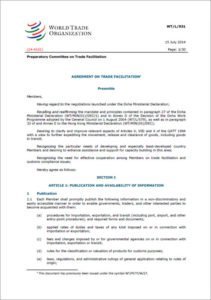Trade Facilitation Agreement
The Trade Facilitation Agreement (TFA) is a binding multilateral trade agreement between members of the World Trade Organization (WTO). The mission of the Global Alliance for Trade Facilitation is to support the implementation of this agreement which aims to make cross-border trade easier, faster and cheaper.

The Trade Facilitation Agreement (TFA) is a binding multilateral trade agreement between members of the World Trade Organization (WTO). The TFA was concluded in December 2013 and it officially entered into force in February 2017.
The mission of the Global Alliance for Trade Facilitation is to support the implementation of this agreement which aims to make cross-border trade easier, faster and cheaper.
The agreement is designed to tackle the barriers to trade posed by burdensome border requirements. These barriers make it harder for businesses of all sizes to trade internationally but hurt small and medium-sized enterprises the most.
By signing up, countries commit to reducing red tape at borders – from measures to ensure quicker release and clearance of goods to better cooperation between border agencies. These reforms will increase transparency and efficiency, reduce bureaucracy and corruption and ultimately make trade easier, faster and cheaper.
The TFA is a unique opportunity to further development goals such as sustainable growth, poverty reduction and gender equality. Taken together, reforms have the potential to reduce trade costs by 14.3% on average and create around 20 million jobs, mostly in developing countries.